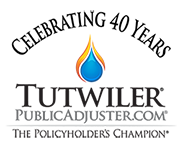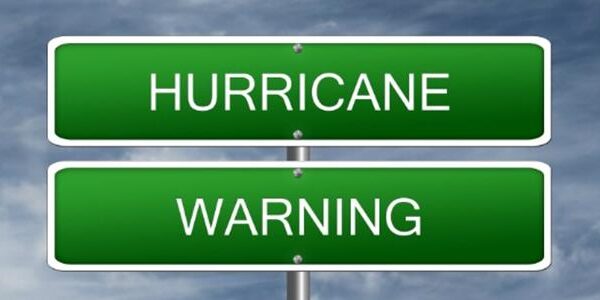There is no escaping the property damage that Hurricane Irma will cause to some parts of Florida. This type of storm can throw off tornado activity and pockets of heavy wind gusts. As a result, thousands of homeowners may be contacting their insurance company to file an insurance claim. Resources are likely to be stretched and frustration with claims will grow as our public insurance adjusters have seen with past storms. We want everyone to stay safe and also be in a condition to recover as best they can.
If you experience property damage from Hurricane Irma, here are a few claim tips for filing your insurance claim that will make the process easier and possibly protect your claim from denial or other problems, especially if you have to evacuate:
1. Only check for damage after the storm passes. Do not go back into your home or mitigate damage until you know it’s safe to do so. If returning to your home after an outage, do not turn on the power right away, especially if your home has been flooded by broken water pipes. Have an electrician check the dwelling first.
2. Take extensive photographs of all the damage and keep all your receipts and documents as well as records of conversations with the insurance company. Make an itemized list of all the storm-related damage noting any structural damages and damage to personal property.
3. Contact your insurance company as soon as possible. While waiting for the insurance company’s adjuster to arrive, take steps to prevent further damage (mitigate) to your property. If the roof has a hole in it, place a tarp over it. If a window is busted out, board it up. Your insurance policy requires you to “mitigate” your damage, meaning you have to take reasonable steps to prevent the property from sustaining further damage. If you need help making repairs, hire a licensed contractor in your area for the emergency services. But do not make permanent repairs or throw out damaged items until the adjuster has inspected your property. They will need proof of the damage to approve your claim.
4. Do not sign a “work authorization” form with a contractor unless you understand what you are signing. If they are there to do the board-up make sure it only says board-up. Do not approve anything else until the insurance company and their claim adjuster has the opportunity to inspect the damage and agrees to the contractor’s scope and method of repair. Also beware of signing a contract with an “assignment of benefits” (also referred to as AOB) clause which gives all the rights and proceeds of your insurance claim to the contractor. This is being abused by some contractors and water restoration firms who drive up their fees to the insurance company and then sue them under the provisions of your insurance policy when they don’t pay.
5. Be present when the adjuster working for the insurance company arrives and make sure to show them all damage. Ask the adjuster for his or her credentials and work experience. It may come as a surprise, but many insurance adjusters are only required to complete a three day crash course before they are allowed to show up at your door. If you feel they are not qualified or you are not happy with the adjuster, engineer, or any other so called “expert” the insurance company provides, demand a new person as soon as possible. Take your time and do not let them rush you. Also take notes of things you agree upon and also those you disagree on. In many cases the adjuster who shows up to your house first will not see your claim through to the end. Get everything in writing in case the next adjuster disagrees with what the first adjuster agreed to.
6. Some insurance companies now operate what are called a Managed Repair program which means they send out contractors who have signed work agreements with them to fix your property, sometimes at fixed or reduced fees. This is done to save claims expenses and also avoid unethical contractors. A problem with this is that a contractor may not follow best practices because their profits are squeezed and they are under the control of what the insurance company tells them to do. Unless you have an insurance policy that states you must use your insurers Managed Repair program, you have the right under Florida law to hire your own contractor. At the very least, we would recommend you get competing quotes and advice on how to repair so you can approach the situation as an informed property owner. Remember, it’s your property and you have to live with it long after all the vendors have left.
7. Try to have your contractor present during the meeting to answer questions. If the adjuster advises you to start the repairs get it in writing. If your contractor wants to repair damaged items not discussed during the meeting, call the insurance company and get their permission in writing.
8. Ask for a copy of the adjuster’s “damage estimate report” and review it for accuracy and mistakes. Also ask for a copy of the claims file because you’re entitled to it.
9. If your home is uninhabitable, most insurance policies will pay for additional living expenses (ALE) and rental costs while your home is being repaired. But make sure to keep all transactions on a credit card so you can provide proof to your insurance company adjuster.
10. Be proactive but patient. Make sure to hire the right professionals to help document the loss and damage. If you feel overwhelmed or intimidated by the process or feel your insurance company is not offering a fair settlement, consider hiring a public insurance adjuster to help with your claim. A public adjuster works directly for you and will handle every aspect of your claim, meeting with the insurance company’s adjuster/contractors and ultimately negotiate the best possible settlement so you can repair and restore your property or business in its entirety. Public adjusters are typically compensated based on a percentage of your recovery. In disaster situations, Florida State law limits that fee to no more than 10% of the claim proceeds. Be prepared when the insurance company adjuster shows up and respectfully request an “advance payment” until an agreement can be reached on the rest of your claim.
Here is a great article about How to make your Hurricane Irma insurance claim go smoothly as possible and some useful Links below. To all our family, friends and clients. Stay safe.
USEFUL LINKS:
The Florida Division of Emergency Management
The National Weather Service’s Hurricane Safety Tips and Resources page
The National Hurricane Survival Initiative
County-by-county information on resources, shelters, storm tracking, and local government briefings
If you have questions regarding any property insurance related issues caused by Hurricane Irma please call 800.321.4488 or contact a licensed Florida Public Adjuster to submit a question to one of our insurance claim experts.

